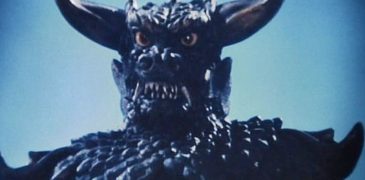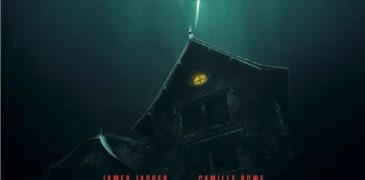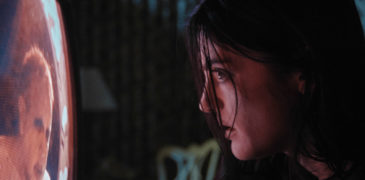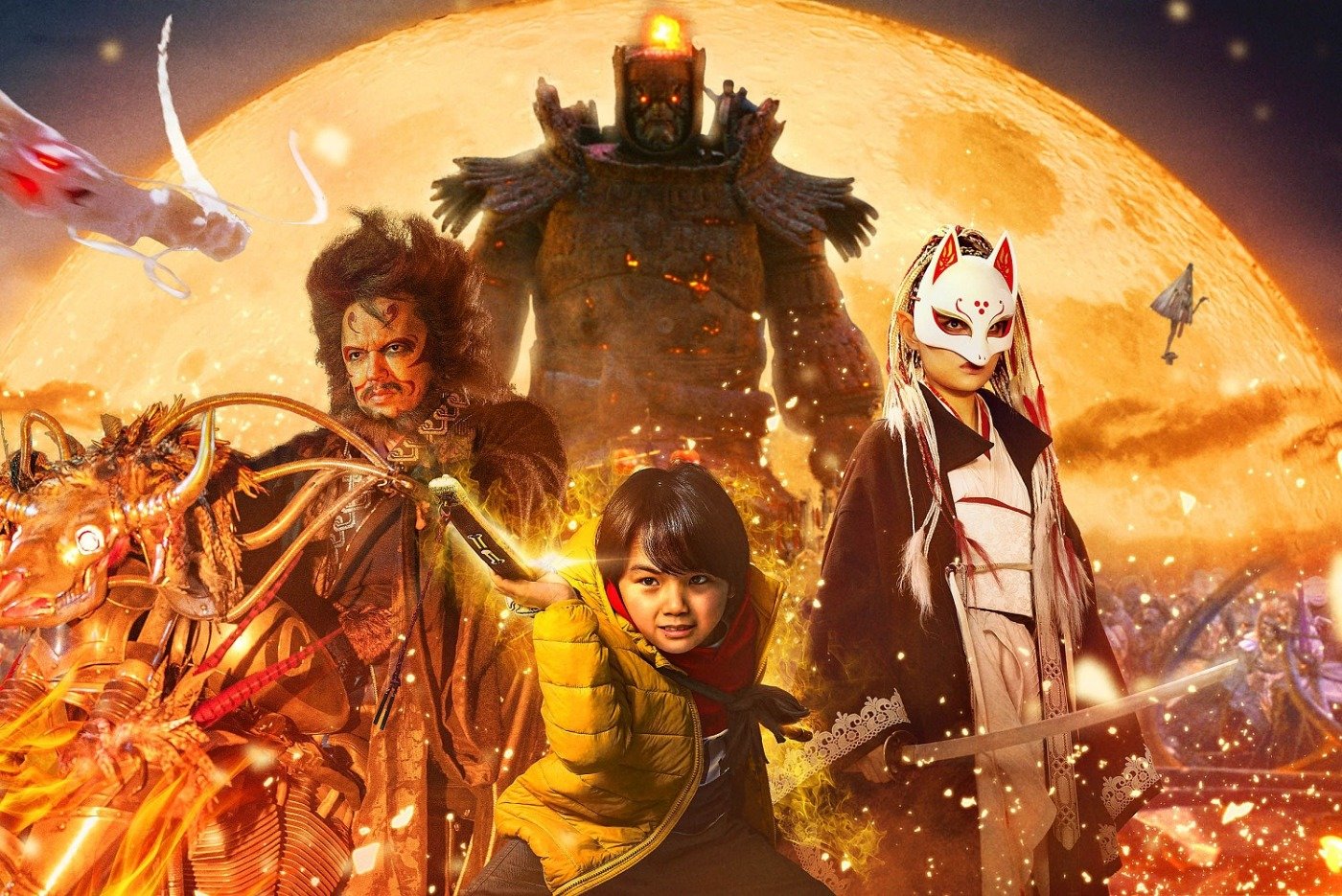
There’s a funny kind of serendipity when you’re a fan commentator on popular entertainment, where you can sometimes just barely miss a critical piece of information that hits a smidge after you’ve published your piece. For example, in July of 2020, Kyle Byrd and I gave a presentation titled “Great Yokai War or GREATEST Yokai War?” for the Kaiju Masterclass convention. We did so to commemorate the 15th anniversary of Takashi Miike’s eponymous film, an attempt to reboot the 1960s Yokai Monsters franchise from Daiei, and, at the time, our conclusion was that despite fair box office earnings, aspirations for further entries in the franchise had been effectively quelled. Mere months after that, a sequel was announced, quite a shock given that the only other media for the franchise in the interim had been a low-profile RPG card game (and manga spinoff) in 2012.
Shortly thereafter, I had the opportunity to participate in writing an essay for Arrow’s stellar Blu-ray release of the Daimajin trilogy. Completely unsuspectingly, I penned a piece describing the numerous (mostly failed) attempts to relaunch the character, including one from director Takashi Miike, as well as mentioning the famous golem’s apocryphal clashes with The Great Yokai War’s antagonist Yasunori Kato. I ended the essay on the hopeful note that, despite a decade out of the spotlight, Daimajin would return someday…then, a few weeks after finalizing the draft with Arrow, news broke that the new Great Yokai War: Guardians would mark the giant’s first cinematic outing since 1966. Such information would have been a fantastic capstone, but, as Maxwell Smart says, “missed it by that much.”
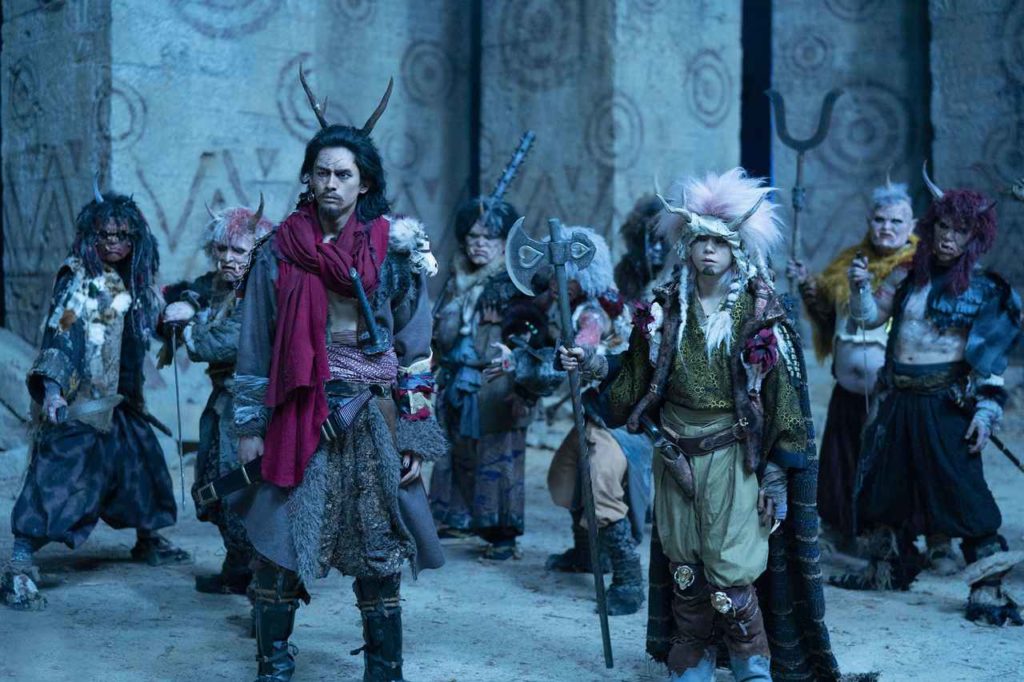
The stars did align, however, with an opportunity to see the film theatrically, thanks to the Japan Cuts film festival in New York. The small crowd was mixed: general Japanese cinephiles, yokai lovers, Miike fans, kaiju groupies who were just there for Majin, but the consensus was universal: “It’s alright.” The picture’s unabashedly a children’s movie (which might shock the Miike fans who begin and end with Audition and Ichi the Killer without looking at how most of his most recent decade has been dedicated to magical girl shows), and aside from one yuki-onna with an implied masochistic kink, there’s not much edge to be had, even compared to the 2005 picture.
To answer many people’s first question: this is a sequel, but there’s no necessity to have seen the prior film. A few minor characters do recur (ambiguously including an entertaining little cameo from now-grown Ryunosuke Kamiki), but this narrative is self-contained. The plot revolves around two brothers, Kei (rising star Kokoro Terada, best known to effects fans for his role as Damian in Tokusatsu Gagaga) and Dai (Ray Inomata), latchkey kids who also happen to be descendants of the mythological demon slayer Watanabe no Tsuna (played in flashback by the always-entertaining Kazuki Kitamura). Kei, the elder, is approached by a group of yokai hoping that he can stop the ancient giant Yokaiju (a sea monster not quite the same as the similarly-named creature from Gegege no Kitaro) on its trek across Japan’s Magna Fossa towards Tokyo, since destroying the city would awaken a certain “you know who” that’s sealed there to threaten the world. When Kei refuses, the yokai recruit the much more copacetic Dai instead, leading Kei to step up and go on a quest to save his younger brother, especially necessary since it seems the yokai’s plan is to sacrifice Dai to the war god Bujin (that’s Daimajin) to buy the stone deity’s aid in the fight. Along the way, Kei forms a party of misfit yokai buddies, including the stoic Kitsune (Hana Sugisaki of Blade of the Immortal and Bleach) and meekly slapstick Amanojaku (Eiji Asako of Kamen Rider Build), teaching them lessons about friendship and empathy as he goes.
Miike is never a filmmaker to repeat himself even when he does sequels, so in a way it’s unsurprising that this movie doesn’t really tread the same thematic ground as the former. While these kids are still without a father figure, familial motifs in this focus much more on the fraternal bond than absentee parents. Major elements of the former picture, such as coming-of-age or modernization, are also no longer present, perhaps stripped down by going with only a single screenwriter, Yusuke Watanabe (the live-action Gantz and Gatchaman), who did not work on the former, though the former film’s consultant Hiroshi Aramata remained onboard as a producer and to write the novelization. The end product makes for a pleasant diversion, but probably won’t stick with viewers the same way as the 2005 film.
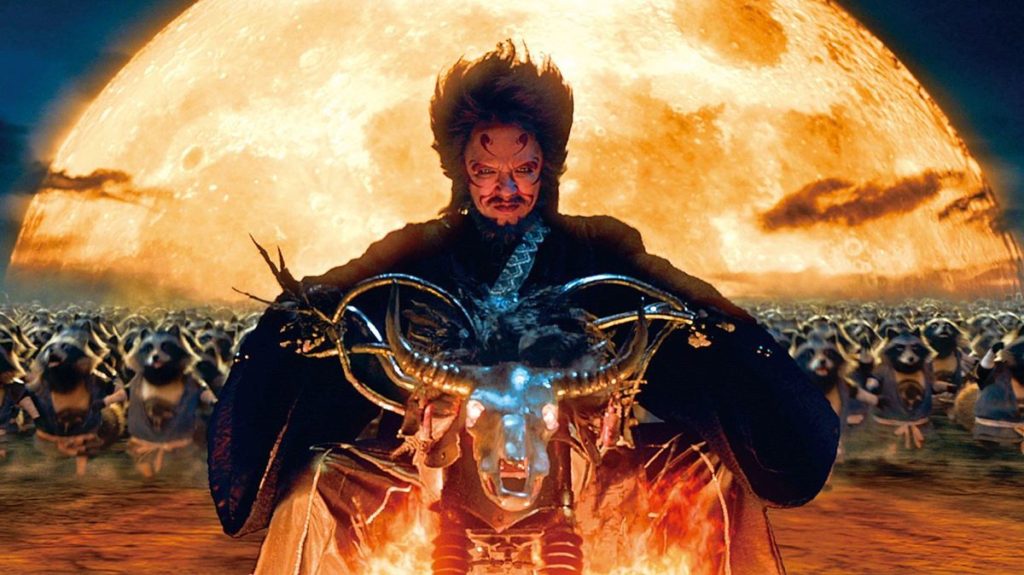
Junya Inoue returns to monster design duties, and this time is joined by monster design maestro Katsuya Terada (who, in addition to being fantastic, fits in since his colleague Takayuki Takeya worked on the first movie). However, without the nightmarish technological monstrosities designed by the late Yasushi Nirasawa, the variety of yokai on screen feels contracted from the original, and I would not be surprised to learn of either a decreased makeup/prop budget or a shortened production period. There is a very fun scene towards the start, however, with a “World Yokai Summit”, a sort of UN for spooks, where Japan’s yokai meet to discuss international matters with the likes of Frankenstein, a vampire, a mermaid, the Yeti, and Pennywise.
Daimajin is handled quite well, in a virtually perfect combination of reverence for the 1960s depiction with some modern updates (such as a flaming hitodama hovering above his head at all times). He’s set up well in the story, gets a fair amount of screentime, and generally feels like the malevolent deus-ex-machina badass that we all love. A few of the CGI shots with the character are gorgeously composed, vibrantly color-contrasted cinematography, serving as a real highlight of the runtime. There’s been a dearth of merchandising for the movie, but I’m really hoping that a vinyl figure of this incarnation is coming at some point in the future, if nothing else.
The metaphorical elephant in the room will likely be getting into spoiler territory, but one of the most contentious topics surrounding the movie is the ending. There’s certainly a through line that leads to the conclusion, and there is a good message for children therein, however the execution feels anticlimactic, as the bewildering way that it occurs will likely polarize audiences based on their patience for Japanese iconography paired with Miike’s trademark absurdity. There are some plot threads left unresolved by the narrative, as well, so parts feel a bit like an unfired Chekov’s gun. It’s unclear if the idea was to keep things open for a sequel, which, based on box-office so far seems unlikely…but, given my track record on such matters, we may very well see one announced within a couple of months of this writing.

More Film Reviews
Zalava (2021) Film Review – Superstition, Paranoia and Demons
A little bit of superstition never really hurts anyone and for most people their superstitions are pretty mild. That isn’t the case for the residents of Zalava, a small town…
Film Insight: Pulgasari (1985) – Kaiju From North Korea
Since the division of Korea into two separate countries in 1948, North Korea have used its cinema to spread propaganda for their “Juche” or self-reliant ideology to the masses in…
The Deep House (2021) Film Review – Drowned Secrets Disturbed
Chasing the dream of a breakout success YouTube video, two urban explorers think they’ve found the perfect location: An old French manor that wasn’t demolished before a lake was dammed….
Creeping Death (2024) Film Review – Get Trick or Treated to Death this Halloween
Films often feature Halloween as one of the most popular holiday settings. And this time, it gets a unique, Gaelic twist in this supernatural slasher from American writer-director Matt Sampere….
Night at the Eagle Inn (2021) Film Review – Paranormal Hauntings
Night at the Eagle Inn was my first experience with the Bloomquist brothers, but it won’t be my last. If you are looking for a deep psychological thriller, wait…
The Awakening of Lilith (2021) Film Review – The Excruciating Weight of Loss
Sparked by the death of her partner Noah, Lilith is struggling with her mental health and has succumbed to a deep depression that affects all aspects of her life. Fighting…

A lifelong Japanese genre fiction fan, Kevin is the primary writer for the Maser Patrol blog. He also authored the book Kaiju for Hipsters: 101 Alternative Giant Monster Movies, is a frequent guest host on the Kaiju Transmissions podcast, and occasionally contributes to home video liner notes for tokusatsu releases. TLDR: he really likes talking about monsters.

